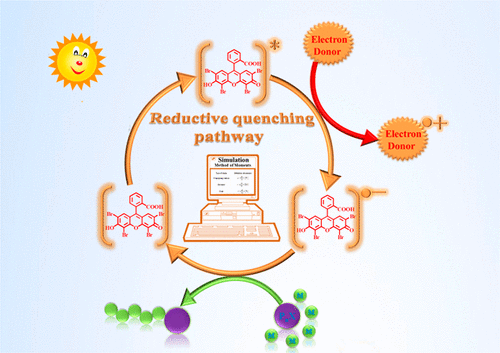当前位置:
X-MOL 学术
›
Macromolecules
›
论文详情
Our official English website, www.x-mol.net, welcomes your
feedback! (Note: you will need to create a separate account there.)
Aqueous Metal-Free Atom Transfer Radical Polymerization: Experiments and Model-Based Approach for Mechanistic Understanding
Macromolecules ( IF 5.1 ) Pub Date : 2018-03-15 00:00:00 , DOI: 10.1021/acs.macromol.8b00348 Chao Bian 1 , Yin-Ning Zhou 1 , Jun-Kang Guo 1 , Zheng-Hong Luo 1
Macromolecules ( IF 5.1 ) Pub Date : 2018-03-15 00:00:00 , DOI: 10.1021/acs.macromol.8b00348 Chao Bian 1 , Yin-Ning Zhou 1 , Jun-Kang Guo 1 , Zheng-Hong Luo 1
Affiliation

|
Metal-free atom transfer radical polymerization (ATRP) was successfully achieved in aqueous media for the first time. Polymerization of poly(ethylene oxide) methyl ether acrylate (PEGA480) was well controlled (Đ < 1.40) under visible light irradiation using tetrabromofluorescein (Eosin Y) as catalyst and pentamethyldiethylenetriamine (PMDETA) as electron donor. A validated kinetic model was developed to investigate the process of photoredox catalytic cycle via reductive quenching pathway. Experimental and simulation results showed that electron donor not only had an important influence on the ATRP activation, but also participated in the ATRP deactivation. Furthermore, the effects of water content, catalyst concentration, and degree of polymerization on the polymerization were studied thoroughly by a series of experiments. Good controllability of the polymerization regulated by light on and off confirmed the high degree of temporal control. The livingness of the chains was proved by a successful chain extension experiment. Both experimental and simulation techniques were used to study aqueous metal-free ATRP, which provided a promising method to synthesize polymers in the absence of metal and organic solvent.
中文翻译:

无水原子转移自由基聚合:机械理解的基于实验和基于模型的方法
首次在水性介质中成功实现了无金属原子转移自由基聚合(ATRP)。聚(环氧乙烷)甲基醚丙烯酸酯(PEGA 480)的聚合受到良好控制(Đ<1.40)在可见光照射下,使用四溴荧光素(Eosin Y)作为催化剂,五甲基二亚乙基三胺(PMDETA)作为电子给体。建立了经过验证的动力学模型,以研究通过还原猝灭途径进行的光氧化还原催化循环的过程。实验和模拟结果表明,电子给体不仅对ATRP的活化有重要影响,而且还参与了ATRP的失活。此外,通过一系列实验深入研究了水含量,催化剂浓度和聚合度对聚合的影响。通过开和关光调节的聚合反应的良好可控制性证实了高度的时间控制。通过成功的扩链实验证明了链的活力。
更新日期:2018-03-15
中文翻译:

无水原子转移自由基聚合:机械理解的基于实验和基于模型的方法
首次在水性介质中成功实现了无金属原子转移自由基聚合(ATRP)。聚(环氧乙烷)甲基醚丙烯酸酯(PEGA 480)的聚合受到良好控制(Đ<1.40)在可见光照射下,使用四溴荧光素(Eosin Y)作为催化剂,五甲基二亚乙基三胺(PMDETA)作为电子给体。建立了经过验证的动力学模型,以研究通过还原猝灭途径进行的光氧化还原催化循环的过程。实验和模拟结果表明,电子给体不仅对ATRP的活化有重要影响,而且还参与了ATRP的失活。此外,通过一系列实验深入研究了水含量,催化剂浓度和聚合度对聚合的影响。通过开和关光调节的聚合反应的良好可控制性证实了高度的时间控制。通过成功的扩链实验证明了链的活力。











































 京公网安备 11010802027423号
京公网安备 11010802027423号